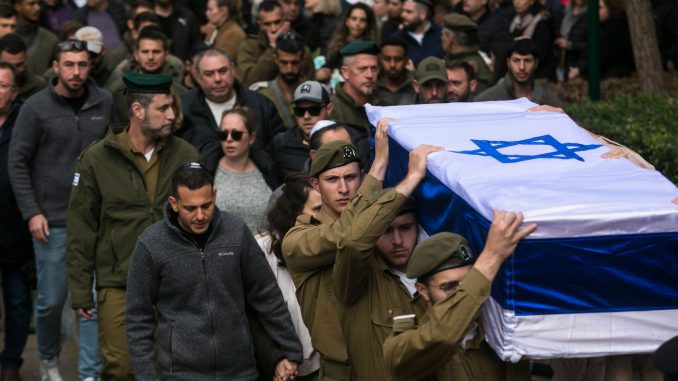
At first, they’d tried to break into houses using their machine guns—shooting through walls, doors and windows. When that didn’t work, they used crowbars on the door handles.
But that didn’t work, either, so they gained entrance by ripping the doors off their hinges. The doors they threw into the streets, where they still lay.
It had taken me awhile—as a nonmilitary American at the Kfar Aza kibbutz on the Israeli side of the border with Gaza—to figure out how things had unfolded in the Oct. 7 Hamas attack. Dozens of Israelis had died just a few weeks prior on the site we were at, victims of Hamas’ unprecedented attack on Israel.
I’d visited Israel once before as a member of the American Israel Public Affairs Committee’s national council. But the events of Oct. 7 have rendered that country and its region a new place. As one of the first Americans allowed to visit Israel since Oct. 7, I decided to share takeaways from what I saw.
- Oct. 7 was Israel’s 9/11. Only much bigger.
Oct. 7 was the single-bloodiest day in the history of the state of Israel, and that’s saying something, given the neighborhood in which she finds herself.
Israel is a small country, with a population of just 9.4 million, and 1,200 Israelis died that day. In terms of percentage of the population killed, Oct. 7 would be akin to Americans enduring the tragedy of 9/11 some 14 times over.
- Israeli society, recently bitterly divided on public policy, is united post-Oct. 7 like never before.
The judicial reform movement last year saw tens of thousands of Israelis across demographic and political spectrums come out and protest Prime Minister Benjamin Netanyahu’s administration.
It risked tipping the country into American-style political dysfunction. But those fissures have disappeared, post-Oct. 7. Israelis of every stripe are united once again against a common, external enemy.
The unity across Israeli society at this moment is palpable. We saw evidence of this everywhere and from everyone we spoke to—civilians, journalists, military leaders, veterans, volunteers, ethnic and religious minorities and politicians alike.
- Hamas’ crimes against Israelis on Oct. 7—particularly against Israeli women—were entirely planned, comprehensive and intentional.
The reports and evidence of widespread rape, torture and genital mutilation of Israeli women at the hands of Hamas terrorists are widespread and irrefutable. They were also uniform across many different attack sites.
- Virtually no one in Israel, left or right, wants to hear right now about a “two-state solution.”
I’ve never thought a two-state solution was possible in Israel. How can Israel be expected to coexist with people whose guiding ambition in life is to exterminate her?
But plenty on the left in Israel have held onto the dream of the two-state solution for years. No more, however. Most of the military, civilian and volunteer leaders we met with acknowledged being well to the left side of Israeli politics. None of them appears to consider a two-state solution viable after Oct. 7.
- Voters aren’t happy with Netanyahu, and he’s likely to be defeated at the next opportunity.
Israelis are refreshingly open about how military, political, intelligence, and even societal leaders failed them on Oct. 7. All of the powerful politicians, as well as the intelligence and military leaders responsible for those mistakes have issued full, public mea culpas since. But not Netanyahu. It pains me to say this, as a fan of his, but his polling numbers are abysmal.
- Iran is at the root of the problem.
Israel is impinged on all sides—attacked by Gazan Palestinians in the south and bombarded by rockets from Lebanon-based Hezbollah in the north. Even Yemeni Houthis are in on the action, attacking Israeli and American shipping traveling southward in the Red Sea and the Gulf of Aden.
The thread that ties all these efforts and groups together is Iran, which supports them all—financially, with armaments, and with military training.
This is going to be a long war. Israel is doing what it must in Gaza, but will eventually turn its attention to Hezbollah. If and when those two are resolved in Israel’s favor, she still must deal with the elephant in the room, Iran.
That’s when things will get very interesting.
The Daily Signal publishes a variety of perspectives. Nothing written here is to be construed as representing the views of The Heritage Foundation.
Have an opinion about this article? To sound off, please email letters@DailySignal.com, and we’ll consider publishing your edited remarks in our regular “We Hear You” feature. Remember to include the URL or headline of the article plus your name and town and/or state.
